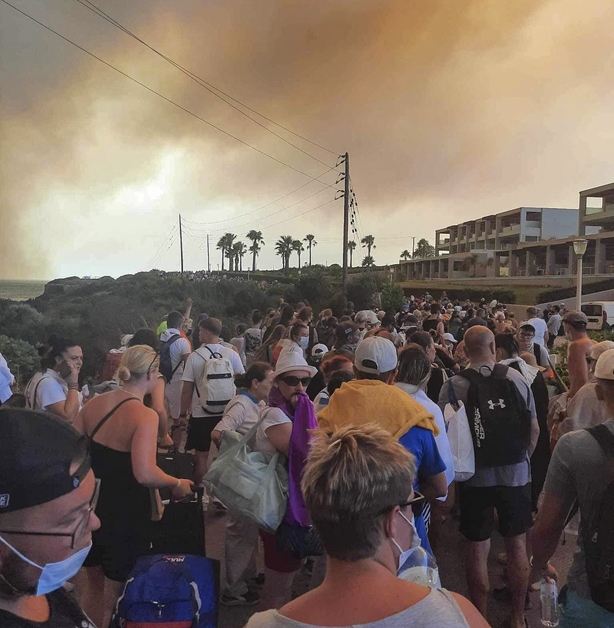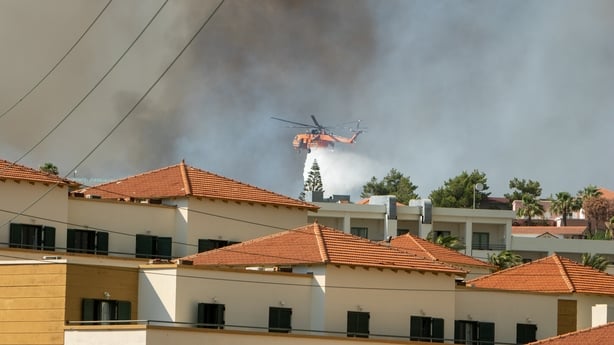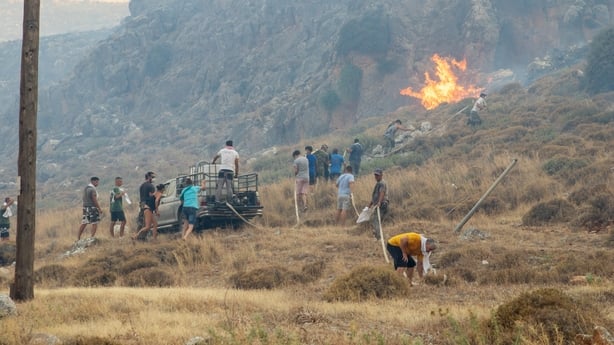A wildfire raging on the Greek island of Rhodes has forced thousands of tourists and island residents to shelter in schools and indoor stadiums after they were evacuated from coastal villages and resorts.
Thousands spent the night outdoors, tour operators Jet2 and TUI cancelled flights departing for Rhodes with more holidaymakers, while Greek authorities said it was among the biggest evacuation operations the country had conducted.
Coastguard vessels and dozens of private boats carried more than 2,000 tourists from beaches yesterday after the wildfire was fanned by strong winds and rekindled along the southeastern part of island popular for beaches and ancient ruins.
Many fled their hotels when huge flames reached the seaside villages of Kiotari, Gennadi, Pefki, Lindos, Lardos and Kalathos.
Large groups gathered in the streets under a red sky waiting to be taken to safety. Smoke hung heavy over a deserted beach.

"We have between 4,000 and 5,000 people now accommodated at different structures," Thanasis Virinis, a vice mayor of Rhode stold Mega television today, calling for donations of essentials such as mattresses and bedclothes.
One government official told Reuters 19,000 people had been moved away from their homes and hotels, 3,000 of them by boats.
Many of them were assisted by police. There have been no reports of casualties.
The Greek foreign ministry was setting up a help desk at Rhodes airport to help organise tourists' exit from the island, including for those who have lost travel documents, the British embassy in Athens said.
Tour operator Jet2 said five planes due to take more tourists to the island would instead fly empty and would take people home on their scheduled flights.
The Greek civil protection ministry did not immediately respond to a request for comment.
More than 250 fire fighters were trying to contain the flames, assisted by 15 aircraft, state television said.
Read more: 'Stay away' from areas in Rhodes affected by fire - DFA
Fire in Lindos
Volunteers fought to extinguish a blaze that blackened the hillside and charred buildings near Lindos, one of the island's most-visited sites and famed for an acropolis perched on a massive rock within medieval walls.
Civil protection has warned of a very high risk of wildfires today in almost half of Greece, where temperatures were expected to hit 45 Celsius.
Heatwaves across southern Europe and many parts of the world could last until August.
Fires are common in Greece but hotter, drier and windy summers have brought more of them in recent years. Climatechange means heatwaves will become more frequent, an advisor to the World Meteorological Organization (WMO) said yesterday.
On Rhodes, the evacuees, including residents from the villages, were housed at hotels, indoor stadiums, conference centres and school buildings, fire brigade spokesman Ioannis Artopoios told Skai radio.
"They have been given food, water and medical help," hesaid, adding that the Greek foreign ministry will assist foreigners who want to leave the country at the Rhodes airport.
Firefighters, backed by aircraft that dropped water, battled three fronts today, setting up firebreaks to prevent flames from spreading to a dense forest or threatening more residential areas.
The fire has scorched swathes of forest and several buildings since breaking out in a mountainous area on Tuesday.

"It is an unprecedented situation for the island," Panagiotis Dimelis, head of the Archangelos village council, told Skai TV, adding that many locals had rushed to help the tourists.
From the moment the evacuation alert sounded early in the afternoon, tourists headed for the beach, pulling their suitcases behind them.
A large part of the island was without electricity as the public power utility PPC shut down the local plant in the south for safety reasons.
More than 200 firefighters fought the blaze during the night, while the air support started early today.
The country is 12 days into a heatwave that has seen temperatures soaring above 40C.
Meteorologists have warned it could be the longest hot spell the country has ever seen.

Tens of millions of people in the northern hemisphere have been suffering through intense heat this summer as the world appears headed for its hottest July on record.
Across the southern United States, about 80 million Americans are sweltering in temperatures of 41C and above, the National Weather Service said.
The southwestern city of Phoenix, Arizona hit 46C yesterday, extending a record-breaking streak to 22 consecutive days of highs above 43C.
In May, the World Weather Attribution, whose scientists study the link between extreme weather events and global warming, said such extreme heat would have been "almost impossible without climate change".
According to the World Meteorological Organization, Europe is the world's fastest-warming continent which has been heating at twice the global average since the 1980s.
Since the mid-1800s, the world has warmed an average of nearly 1.2C.
But in Europe, the figure is almost double, with the continent now 2.3C hotter than in pre-industrial times, the organisation said in a report at the end of June.
